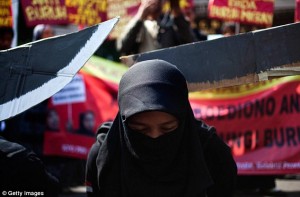
Credit: Getty Images Death sentence: A woman bows her head as protesters demonstrate in Indonesia after a maid from the country was executed in Saudi Arabia
Saudi Arabia sentences maid to death by stoning for adultery – but the man she slept with will escape with 100 lashes
- Sri Lankan maid, 45, was convicted of adultery in Riyadh, Saudi Arabia
- She was ordered to be pelted to death with stones after admitting crime
- But her lover was handed 100 lashings for offence – because he is single
- Now, Sri Lanka has said it is calling on Arab nation to pardon the woman
- Foreign Employment Bureau has hired lawyers to file appeal in the case
By Sophie Jane Evans for MailOnline
https://tinyurl.com/hwkwkln
A married woman has been sentenced to death by stoning in Saudi Arabia after admitting to adultery – while the man she had sex with has escaped with a punishment of 100 lashes.
The 45-year-old Sri Lankan woman who had worked as a maid in Riyadh since 2013, and her partner, also a migrant from the island nation, were both convicted of adultery in August.
However, their sentences were very different.
While the woman was told by a Sharia court she would be pelted with stones until she died for cheating on her husband, her lover was handed only lashes – because he was single at the time.
Now, Sri Lanka has announced it is calling on the Arab nation to pardon the female worker.
Upul Deshapriya, spokesman for the country’s Foreign Employment Bureau, told the Thomson Reuters Foundation that the bureau has hired lawyers to file an appeal in the shocking case.
‘She has accepted the crime four times in the courts,’ Deshapriya said. ‘But the Foreign Employment Bureau has hired lawyers and have appealed against the case.
‘The appeal is going on. Also from the foreign ministry side, they are in negotiation with the Saudi government on a diplomatic level.’
Officials from the Saudi Embassy in Colombo did not respond to requests from the Thomson Reuters Foundation yesterday on whether they would consider the plea for clemency.
Oil-producing Saudi Arabia follows Sharia, or Islamic law, and is often criticised by human rights organisations for the wide range of crimes which carry the death penalty.
These include adultery, drug smuggling and witchcraft.
Stoning, a form of execution where a group throws stones at a person buried waist or chest deep in the ground until they are dead, is still carried out in parts of the Muslim world.
In 2013, Saudi Arabia beheaded a young Sri Lankan housemaid for the killing of an infant left in her care, rejecting repeated appeals by Colombo against her death sentence.
Thousands of men and women from the Indian Ocean island travel to the Middle East every year to seek jobs as maids or drivers.
According to Central Bank data, 279,952 Sri Lankans went to work in Middle Eastern nations in 2014, generating over $7 billion in remittances, around 9 percent of total GDP.
Saudi Arabia, which is current chair of the United Nations Human Rights Council Panel, has executed over 150 people this year, mostly by public beheading.
This figure is the highest in 20 years, rights group Amnesty International said this month.
Foreigners, mostly guest workers from poor countries, are particularly vulnerable as they typically do not know Arabic and are denied adequate translation in court, Amnesty said.
The Sri Lankan maid’s sentence comes as Saudi Arabia plans to execute 55 people convicted of terrorism in an apparent warning to would-be jihadists at a time of militant attacks on the kingdom.
The prisoners were found guilty of involvement in al-Qaeda linked terror attacks which killed more than 100 civilians and 71 security personnel, the Saudi newspaper Okaz reported.
Some of the 55 convicted terrorists are from Awamiya, a largely Shi’ite town in the oil-producing Eastern Province, where the government has suppressed demonstrations for equal rights.
Diplomats in Riyadh say their governments have been assured Saudi Arabia will not execute Shi’ites convicted after protests.
Awamiya residents responded to the news by closing off roads leading into the city with burning debris, local activists said.
The alleged al-Qaeda militants stand accused of attempts to overthrow the government and carry out attacks using small weapons, explosives and surface-to-air missiles, Okaz said.
Riyadh says it provides fair trials to all defendants.

